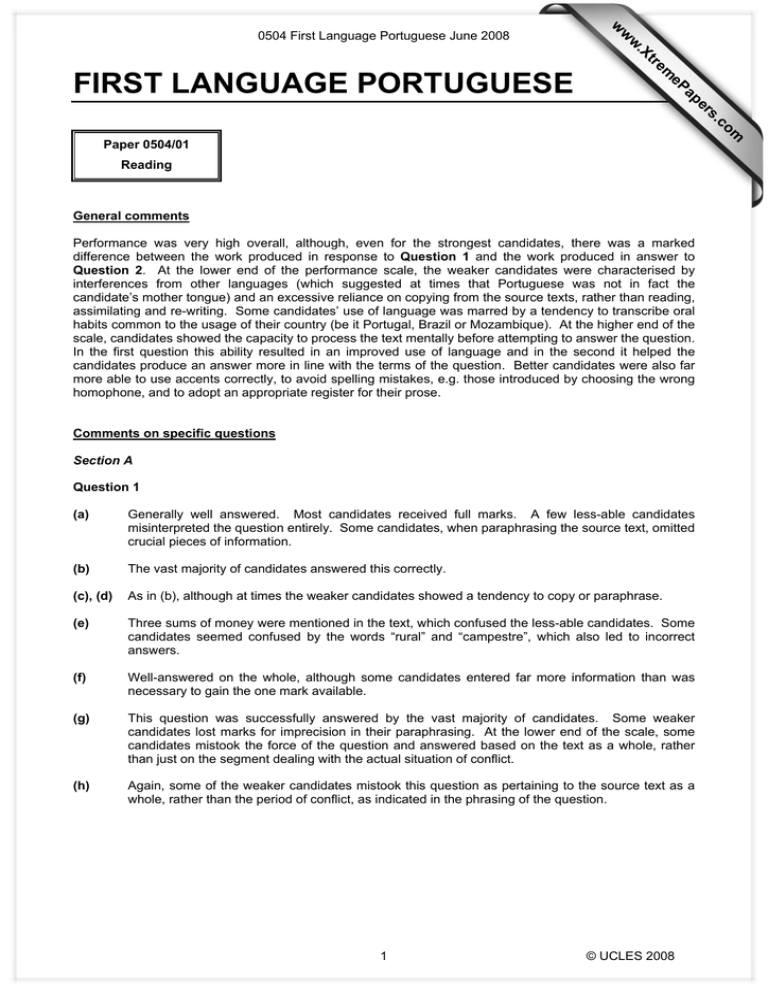FIRST LANGUAGE PORTUGUESE www.XtremePapers.com
advertisement

w w ap eP FIRST LANGUAGE PORTUGUESE m e tr .X w 0504 First Language Portuguese June 2008 om .c s er Paper 0504/01 Reading General comments Performance was very high overall, although, even for the strongest candidates, there was a marked difference between the work produced in response to Question 1 and the work produced in answer to Question 2. At the lower end of the performance scale, the weaker candidates were characterised by interferences from other languages (which suggested at times that Portuguese was not in fact the candidate’s mother tongue) and an excessive reliance on copying from the source texts, rather than reading, assimilating and re-writing. Some candidates’ use of language was marred by a tendency to transcribe oral habits common to the usage of their country (be it Portugal, Brazil or Mozambique). At the higher end of the scale, candidates showed the capacity to process the text mentally before attempting to answer the question. In the first question this ability resulted in an improved use of language and in the second it helped the candidates produce an answer more in line with the terms of the question. Better candidates were also far more able to use accents correctly, to avoid spelling mistakes, e.g. those introduced by choosing the wrong homophone, and to adopt an appropriate register for their prose. Comments on specific questions Section A Question 1 (a) Generally well answered. Most candidates received full marks. A few less-able candidates misinterpreted the question entirely. Some candidates, when paraphrasing the source text, omitted crucial pieces of information. (b) The vast majority of candidates answered this correctly. (c), (d) As in (b), although at times the weaker candidates showed a tendency to copy or paraphrase. (e) Three sums of money were mentioned in the text, which confused the less-able candidates. Some candidates seemed confused by the words “rural” and “campestre”, which also led to incorrect answers. (f) Well-answered on the whole, although some candidates entered far more information than was necessary to gain the one mark available. (g) This question was successfully answered by the vast majority of candidates. Some weaker candidates lost marks for imprecision in their paraphrasing. At the lower end of the scale, some candidates mistook the force of the question and answered based on the text as a whole, rather than just on the segment dealing with the actual situation of conflict. (h) Again, some of the weaker candidates mistook this question as pertaining to the source text as a whole, rather than the period of conflict, as indicated in the phrasing of the question. 1 © UCLES 2008 0504 First Language Portuguese June 2008 Question 2 Question 2 proved much more difficult than Question 1 for all candidates. The best candidates produced thoughtful, creative responses that used the information contained in the two texts to impressive effect. Weaker candidates produced answers which appeared unprompted by the question; they were generally connected with the idea of holiday-making, but they were not sufficiently relevant to plausible activities that an NGO might undertake. In terms of language, stronger candidates were more accurate in grammar, syntax and spelling. In addition, stronger candidates frequently showed a greater capacity to structure their prose both to avoid repetitiousness and better to use the information provided as a jumping-off point for their own ideas. Weaker candidates made some basic, repeated mistakes. 2 © UCLES 2008 0504 First Language Portuguese June 2008 FIRST LANGUAGE PORTUGUESE Paper 0504/02 Writing In this paper candidates were awarded marks in two categories for each of the two compositions they chose. The first mark was out of 12 points, for style and accuracy. The second was out of 13 for content and structure. A high proportion of candidates showed fluency by using well made sentences and a good range of vocabulary. However, some of them were very inconsistent in punctuation, sentence separation, spelling and grammar. The use of paragraphs and evidence of planning also left a great deal to be desired. There were cases of long paragraphs in which there was no punctuation or accents. There were examples of repetitive spelling errors, such as anxioso, technologia, atravez, disapontar, intensão. There was some confusion between influenciar (verb) and influência (noun), and between viajar (verb) and viagem (noun), and some misspelling, for example enterfrenimento. There was the incorrect use of ç in calçei, aqueçer and in conheçer. There were examples of the misplacement of pronouns, resulting in an awkward style of writing: me sentia; se ouviram; me supreendi; deixa eles; respeitar-os; levaram ele; deixa elas; se sentouj; lhe fizeram. There were many examples of very untidy presentation, lack of clear organisation and of poor handwriting. In addition there were examples of the use of inappropriate and unsophisticated language, which resulted in an overall poor style of writing – for example the use of coisa, gente, você, tava, and távamos. Unfortunately a number of candidates did not appear to have read the instructions carefully enough, and only completed one composition (two were required). Others did not attempt to address the central issue in the questions they tackled. For example in Question 1 (c) some candidates failed to address the central issue of society's preparation to face the growth in the number of older people in the world. In Question 1 (b) some candidates failed to address the issue of young people who spend more time playing games on their computers than they do using it for other types of use. In Question 2 (b) some candidates did not read the question carefully enough and wrote about a special journey (viagem especial) and not about a space journey (viagem especial), as required. Some Centres do not seem to have given sufficient stress on the importance of sticking to the maximum number of words in each composition (500). Excessive length can lead to digression and the introduction of unnecessary errors, both of which are penalised according to the mark scheme. 3 © UCLES 2008



